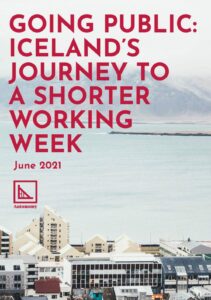Alda and the UK based think-tank Autonomy today publish the first comprehensive report on the Icelandic trials of shorter hours that were conducted in 2015-2019. The trials were run by both Reykjavik City and the Icelandic government.
The main results of the report are:
- From 2015-2019, Iceland ran two large-scale trials of a reduced working week of 35-36 hours with no reduction in pay. The results have been analysed for the first time in a joint project by Autonomy and the research organisation Association for Sustainability and Democracy (Alda) in Iceland.
- Analysis of the results which included 2,500 workers – over 1% of Iceland’s entire working population – suggests important lessons for both employees and businesses.
- The trials were an overwhelming success, and since completion 86% of the country’s workforce are now working shorter hours or gaining the right to shorten their hours.
- Productivity and service provision remained the same or improved across the majority of trial workplaces.
- Worker wellbeing dramatically increased across a range of indicators, from perceived stress and burnout, to health and work-life balance.
- The trials also remained revenue neutral for both the city council and the government, providing a crucial, and so far largely overlooked blueprint of how future trials might be organised in other countries around the world.
The report is available here.


Recent Comments